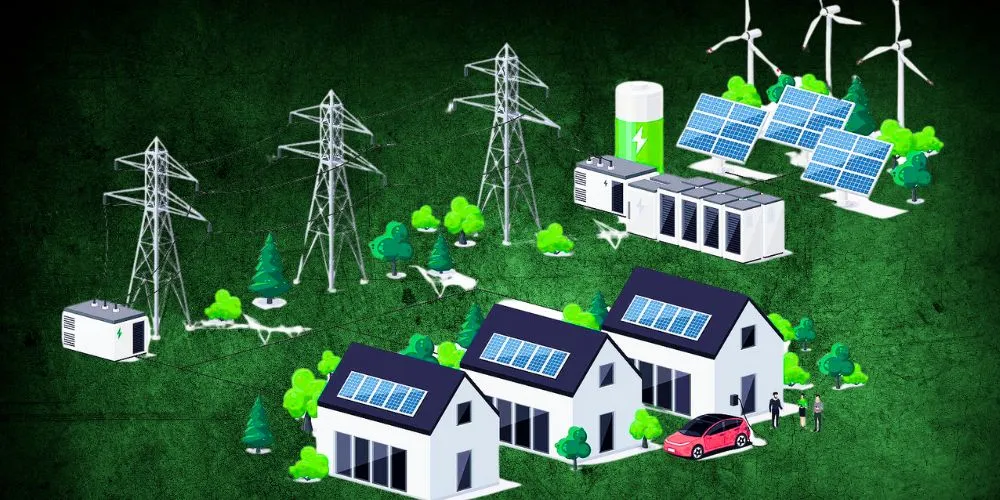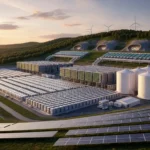Power generation is a cornerstone of modern society, providing the energy that fuels industries, businesses, homes, and technological advancements. Power generation is constantly evolving, shaped by technological innovations, environmental concerns, and the transition towards sustainable energy sources. This analysis provides a comprehensive overview of the current state of the power generation market, key trends, major players, challenges, and prospects.
Market Overview
The global power generation market is a critical sector that meets the growing energy demands of industries and populations worldwide. Power generation involves the production of electrical energy from diverse sources, including fossil fuels, nuclear power, renewable energy, and emerging technologies. The market encompasses traditional centralized power plants and decentralized and distributed energy resources.
The Techgolly market analysis team’s preliminary estimate is that the global Power Generation market was valued at USD 1,850 billion in 2024 and is projected to reach USD 2,624 billion by 2030. Growth will continue at a compound annual growth rate (CAGR) of 4% to 6% from 2024 to 2030.
The power generation market is experiencing significant growth, driven by rising demand for electricity across the industrial, commercial, and residential sectors. As the world embraces digitalization and electrification, the need for reliable, affordable, and sustainable power solutions continues to rise. Governments, businesses, and individuals are transitioning towards cleaner energy sources to mitigate environmental impact, making renewable energy a major driver of market expansion.
Key Market Trends
The power generation market is characterized by several key trends shaping its growth and transformation.
Renewable Energy Dominance
Renewable energy sources, including solar, wind, hydro, and geothermal, are witnessing a surge in adoption and investment. Governments and businesses worldwide are setting ambitious targets to transition towards renewable energy to reduce greenhouse gas emissions and combat climate change. The declining costs of renewable energy technologies, improved efficiency, and favorable government policies are driving growth in renewable energy in the power generation market.
Energy Storage Revolution
Energy storage technologies, such as batteries and pumped hydro storage, are gaining prominence for addressing intermittency issues associated with renewable energy sources. Energy storage provides grid stability, enables better integration of renewable energy, and supports energy distribution during peak demand. Advancements in energy storage solutions are revolutionizing the power generation landscape, making renewable energy a reliable and consistent source of electricity.
Electrification and Decarbonization
The trend towards electrifying sectors like transportation, heating, and industrial processes is accelerating. Electrification coupled with decarbonization strategies is a key approach to reduce reliance on fossil fuels and lower carbon emissions. Electric vehicles, heating systems, and electrified industrial processes are becoming essential components of a low-carbon future, driving the demand for increased power generation capacity.
Digitalization and Smart Grids
Integrating digital technologies and smart grid solutions optimizes power generation, transmission, and distribution. Advanced analytics, the Internet of Things (IoT), and artificial intelligence enhance grid efficiency, predictive maintenance, demand forecasting, and grid security. Smart grids enable real-time monitoring, efficient energy use, and improved grid resilience, making them integral to the modern power generation landscape.
Challenges
The power generation market faces several challenges that must be addressed to ensure sustainable growth and a seamless energy transition.
Energy Transition and Grid Integration
The transition from traditional fossil fuel-based power generation to renewables requires a comprehensive transformation of the energy landscape. A significant challenge is adapting the existing grids to integrate renewable sources seamlessly while ensuring reliability and stability. Grid modernization and the effective integration of decentralized energy sources are crucial to addressing this challenge.
Financing and Investment
The capital-intensive nature of power generation projects, especially for renewable energy installations and infrastructure upgrades, presents a financial challenge. Attracting sufficient investment and financing to fund these projects is essential to drive the energy transition and achieve sustainability goals. Governments and private sector entities must collaborate to create favorable investment environments and innovative financing models.
Policy and Regulatory Landscape
Government policies and regulations heavily influence the power generation market. Inconsistent or uncertain policies can hinder investments and disrupt market growth. Clear and stable policies that promote renewable energy incentivize clean technologies. Establishing a level playing field for all energy sources is vital for driving the necessary transitions in power generation.
Energy Access and Equity
Ensuring access to reliable and affordable electricity remains a global challenge, especially in remote or underserved areas. Bridging the energy access gap and promoting energy equity requires concerted efforts involving governments, the private sector, and international organizations to deploy suitable technologies and infrastructure.
Future Outlook
The power generation market is set for significant transformations, driven by technological advancements, policy shifts, and the imperative for sustainability. Key future developments include.
Hydrogen Economy
The emergence of a hydrogen economy, in which hydrogen is produced from renewable energy, stored, and used as a clean energy carrier, is a promising development. Hydrogen has the potential to significantly decarbonize sectors such as industry and transportation, making it a key focus for the future power generation market.
Electrification of Industries
The electrification of industrial processes, particularly in energy-intensive sectors such as manufacturing and heavy industry, will accelerate. The growing share of renewable energy in the grid will support electrification, making industries more sustainable and reducing their carbon footprint.
Community and Localized Energy Systems
The rise of community and localized energy systems, often called microgrids, will enhance energy resilience and support local communities. These systems enable decentralized energy production, storage, and consumption, promoting energy security and sustainability at a local level.
Conclusion
The power generation market is on the brink of a profound transformation, shifting towards sustainable, efficient, and technologically advanced energy solutions. The successful integration of renewable energy, energy storage, electrification, and digitalization will define the trajectory of the power generation landscape. Overcoming challenges and embracing innovation and collaboration will be pivotal in achieving a clean, reliable, and equitable energy future.





